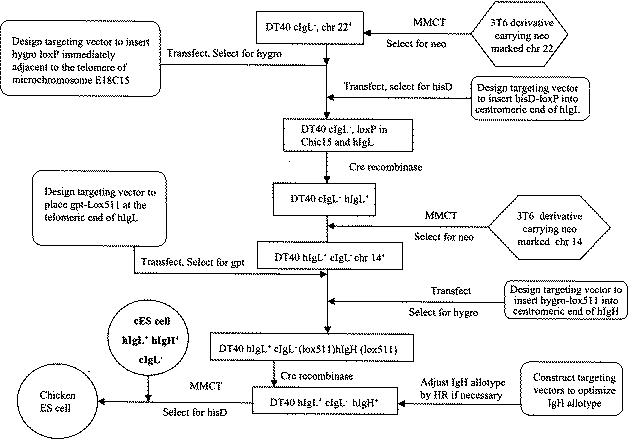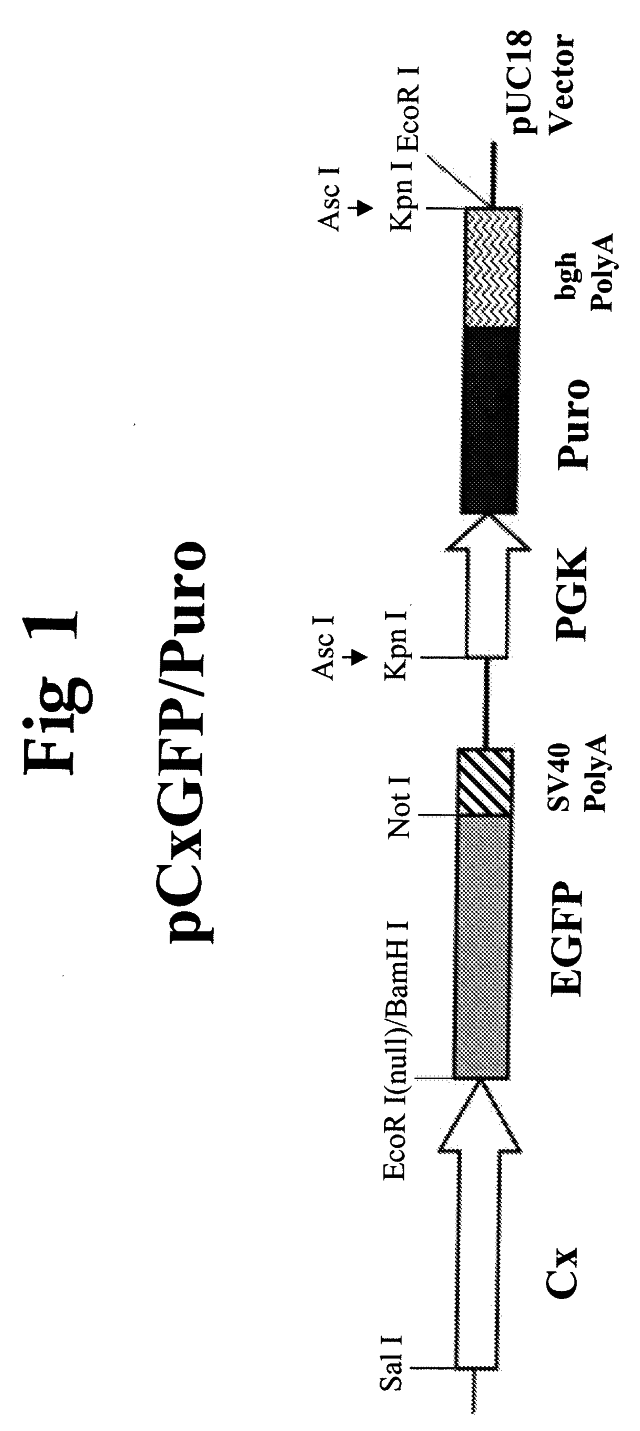Targeting constructs for the functional disruption of avian immunoglobulin genes
a technology of avian immunoglobulin and functional disruption, which is applied in the field of genetic engineering and non-mammalian transgenic animals, can solve the problems of endogenous immunoglobulin production disruption, and achieve the effect of preventing gene expression and disrupting endogenous immunoglobulin production
- Summary
- Abstract
- Description
- Claims
- Application Information
AI Technical Summary
Benefits of technology
Problems solved by technology
Method used
Image
Examples
example 1
The Functional Disruption or Knockout of the Endogenous Avian Immunoglobulin Gene by Homologous Recombination in Avian Embryonic Stem Cells
[0101]The puromycin expression cassette (1.5 Kb) was released from pKO SelectPuro (Stratagene) by Asc I digestion. Referring to FIG. 4, the resulting fragment was inserted into the Asc I site of pKO Scrambler 910 (Strategene), and verified by a Xho I digestion. Thymidine Kinase expression cassette (2.0 Kb) was released from pKO SelectTK (Stratagene) by Rsr II digestion. The resulting fragment was inserted into the Rsr II site of pKO Scrambler Puro, and verified by Sph I digest. The plasmid illustrated in FIG. 4 is the starting point for all the IgH and IgL targeting constructs.
IgH KO
[0102]A genomic DNA fragment of chicken IgH (DJ-6) in germline configuration was obtained from Dr. Claude-Agnes Reynaud, University Paris. The 6.2 Kb EcoR I fragment contains coding sequences of the chicken IgH DX, D1, and JH.
[0103]Referring to FIG. 5, the DX, D1, and...
example 2
Chromosome Transfer Using DT40 Cells
[0115]DT40 cells containing chromosome of interest, such as an avian chromosome 15 lacking the immunoglobulin heavy chain locus, are grown up in DMEM / 10% FBS / 5% chicken serum / 10% tryptone phosphate broth / 0.1 μm β-mercaptoethanol / 2 mM glutamine / pen-strep and appropriate selection drug. 1.6×108 cells are obtained and demecolcine is added to 0.01 μg / ml final concentration (1:1000) and maintained for 48-72 hours. Fresh Percoll (Pharmacia) is prepared by equilibrating with NaCl to a final concentration of 150 mM and Hepes buffer, pH 7.0, to a final concentration of 50 mM. 17.5 ml of equilibrated Percoll is added to 6 50-ml Oak Ridge polycarbonate tubes (Nalgene). DT40 cells are harvested by pelleting (save 500 μl for Hoechst staining). The cell population is resuspended in 105 ml DMEM / 10% FBS / 20 μg / ml cytochalasin B (1.3×106 cells / ml) and cell clumps are broken up by trituration before loading onto the gradient. 210 μl of Demecolcine are added to cells...
example 3
The Functional Replacement of Endogenous Avian Immunoglobulin Heavy Chain Genes with Unrearranged Human Loci
[0116]In another embodiment, the engineered chromosome contains a locus that is desired to be deleted and that is proximate to the telomere of an identified chromosome. Referring to FIG. 8, to achieve the deletion, a site specific recombination site is inserted centromeric of the locus such that the entire locus is deleted to yield the engineered chromosome. Alternatively, the recombination site can be placed within the locus such that recombination renders the locus non-functional. In this embodiment, the construct used to create the engineered chromosome may contain exogenous DNA thereby creating a chimeric chromosome that is comprised almost entirely of a native chromosome but with a exogenous segment of DNA at the telomeric region of the chromosome. In a particularly preferred embodiment, the endogenous chicken immunoglobulin heavy chain gene is located at a site that is p...
PUM
| Property | Measurement | Unit |
|---|---|---|
| Volume | aaaaa | aaaaa |
| Volume | aaaaa | aaaaa |
| Volume | aaaaa | aaaaa |
Abstract
Description
Claims
Application Information
 Login to View More
Login to View More - R&D
- Intellectual Property
- Life Sciences
- Materials
- Tech Scout
- Unparalleled Data Quality
- Higher Quality Content
- 60% Fewer Hallucinations
Browse by: Latest US Patents, China's latest patents, Technical Efficacy Thesaurus, Application Domain, Technology Topic, Popular Technical Reports.
© 2025 PatSnap. All rights reserved.Legal|Privacy policy|Modern Slavery Act Transparency Statement|Sitemap|About US| Contact US: help@patsnap.com


